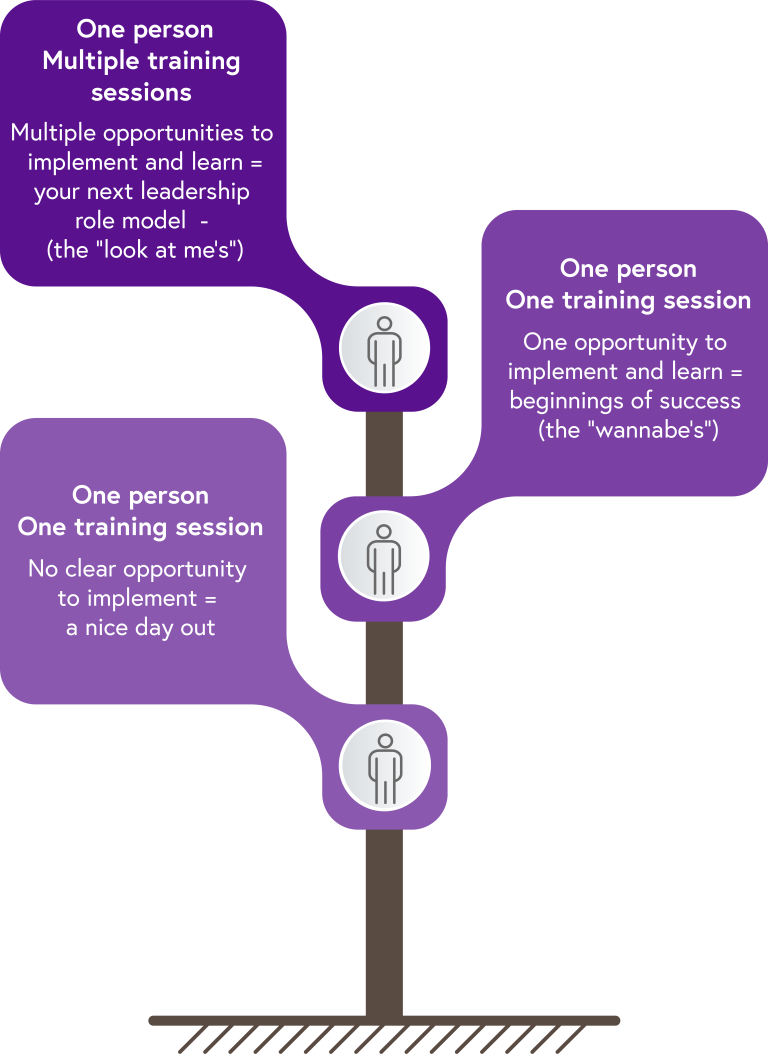From leadership training to leadership role modelling
Do your delegates dip out of training when it gets a bit uncomfortable?
Are you churning out “wannabes” or “look at me’s?”
How often, across your career, have you attended a training course that teaches you the theory or best practise, as well as creating an opportunity for you to put into practise what you have learnt?
Experiential learning
Jaluch’s leadership programme not only provides the opportunity to dip into nearly 40 different management and leadership topics, but twice a year opens up a unique opportunity for delegates to step up and actually put all that learning into practise. Whilst some delegates absolutely relish these experiential learning opportunities, what has been interesting across the past year is how many delegates look to opt out of this practical opportunity, prioritising instead the ‘less messy’, ‘less demanding’ training sessions and eLearning instead. “My manager said it was okay if I was excused from this” is one comment I recollect from the last challenge we ran. Oh … there’s so much I could say about this lacklustre, unaccountable, fixed mindset approach to leadership training that their company is paying for.

Stop pretending that business isn’t ‘messy’
Perhaps the first piece of learning in any leadership training should be that leadership, business, and people are all pretty ‘messy’. So many delegates want things all neatly wrapped up and tidy. But in both life and business things often don’t go to plan, people don’t behave in ways that make our lives easier, and all too often there is an unexpected bogeyman or pot-hole lurking around the corner waiting to catch us out.
The second key piece of learning in any leadership training is that the more we stay in our comfort zones, avoiding the messy, the difficult, the awkward, or the challenging the less we will learn and grow. We’ll simply never transform into great – or even half decent – leaders, if we don’t accept that messy, difficult and awkward is actually good for us. We learn most when our backs are against the wall and we have to draw on every resource we have to get through. We learn least when we’re sat cosy at home logged onto a online training course, being talked at, with a dog on our lap and the ever-present option to turn our camera off when we fancy a snack or snooze!
Unrealistic expectations?
Discomfort, in my experience, is often the result of unrealistic expectations – accompanied by a dollop of fear. If we think that life and leadership are a doddle, then we’ll be thrown off kilter and unhappy the minute anything goes wrong. But if we start out expecting it to be challenging, then we’re ready and (semi) prepared for when the next challenge hits. Challenge should be the norm, not the exception. Challenge should be something we look forward to and value, not hide in fear of. And if challenge is the norm, when the next pot-hole rears its head to throw us off course, we’ll have enough experience to know that what we have to do is stay calm, work as a team, apply what we’ve learnt and keep the faith that we’ll come out the other side.
Developing courageousness
Delegate feedback from those who are courageous enough to say what they really learnt…
After our first ever experiential learning challenge, a delegate said, “I want to apologise to my team, I’d attended the training session on accountability a few months back, but I realised, too late, that I needed to step up and be accountable during this challenge”.
For those of you who read this and think that the challenge was therefore a failure, you are, I believe, wrong. This is experiential learning in action. Learning through our mistakes and having the self-awareness in a safe environment to recognise what we could have done differently is crucial. This delegate will never forget that sinking moment when he realised too late that he could have stepped up. We all make mistakes, but it’s what we do after making a mistake that determines if we’re good leaders.
Another bit of feedback was, “My first ever leadership programme session was on collaboration, but at that time I just never really got how incredibly difficult it is to get people to collaborate when you don’t know anyone and they all appear to be differently invested in the project/outcome. We would have done so much better in my team if we hadn’t spent the first 2 weeks of the 3 week challenge working out that we all needed to work together and value what others could bring to the table”.
In your own organisation, would it make a difference if you had leaders who had the skills to get people to come together to work and succeed, knocking down the walls of silos as they go? Perhaps instead, you have a couple of leaders who pride themselves on how high the walls are that they have built around their team, thus protecting them from enemy departments and rogue strangers who might upset the natural order of things? Leaders who think leadership is about neat and tidy with plenty of control are deluded. This kind of leader can destroy a team if given enough rope. The world is, quite simply, a messy place!
The definition of success and failure in the training room
Someone commented that our first business challenge was a bit of a failure as there was a mismatch between the expectations of the person we were setting up in business and those of the delegates. Interestingly, I viewed this challenge as a success as the idea of our experiential learning is not to eradicate all bumps and lumps in the road making it all smooth sailing for delegates. Instead, the idea is to present a business challenge that is real in every aspect – including the fact that people often come together intending to work on a project with very different intentions and expectations.
The person we set up in business during that challenge, is now running a successful business so those awkward bits of communication, how you succeed when one person is not really listening, how you bend and flex around the sharp edge corners of an uneasy relationship are irrelevant if you can achieve the key thing you set out to achieve with all parties still talking to each other at the end!
Who will relish experiential leadership development?
Delegates that want to practise asking difficult questions, collaborate with people who aren’t their best mates, step up and be accountable when that is needed, work through cultural barriers, problem solve as though their lives depended on it, be more assertive, get more creative, communicate to ensure clarity, manage competing interests and insufficient time, and collaborate with people they don’t know, as well as a load of other learning opportunities, then experiential learning will test them, challenge them and develop them.
A hunger for learning
In my travels around the world over the last few decades, I see a hunger for learning and development in some regions of the world, notably Asia, while elsewhere I encounter a distinct lack of hunger for such things. If you have a manager who is hungry to learn, my advice to you is to really value them as they are not that common in today’s workplace.
Trainers just facilitate learning…
… whilst delegates need to take responsibility for their own development
A delegate (a senior manager) once said to me that the training day I had just delivered hadn’t been useful as I hadn’t changed her behaviours or views. My response was, that as a trainer, I can facilitate her learning, but she’s responsible for her own development i.e. taking that learning on and applying it. I can’t change people’s behaviours or develop their skill sets, if they don’t want to change or don’t want to learn. Employ people who want to learn and show them that you value that attitude.
We need to challenge the belief that a good training course involves passive learning with no deviations from preset content, 3500 PowerPoint slides, and minimal time for questions and discussion. Such an approach, where delegates have felt safe and happy and never out of their comfort zones, for me, is training failure, not success. How can we raise the bar?
Let’s get messy
Let’s challenge our delegates more. Let’s create ‘messy’ training where the answers aren’t always clear. Let’s re-set responsibilities so everyone knows that it’s delegates who are responsible for their own development. Let’s be upfront about the danger of comfort zones and control. Let’s instead engage our delegates in a white water rafting experience that will challenge them, scare them, exhilarate them, enable them to achieve more than they thought they could achieve and break down some of that traditional thinking and behaviours that we need to leave behind if we are to have innovative, confident, competent leaders who role model their way to the tops of our organisations.
Let’s get messy!
Interested in finding out more?
If you want training that delivers more. Talk to us about our experiential learning courses.
📩 If you liked this article and want more, sign-up to receive free fortnightly updates from us.
Disclaimer: The information contained within this article is for general guidance only and represents our understanding of employment and associated law and employee relations issues as at the date of publication. Jaluch Limited, or any of its directors or employees, cannot be held responsible for any action or inaction taken in reliance upon the contents. Specific advice should be sought on all individual matters.
AUTHOR DETAILS

